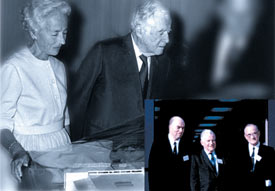Feature Story
| The University of Texas at Dallas (UTD) has an interesting and unique history. It is one of the few universities in the United States that was built from the top down. It began as a research institute, became a state university of graduate students in 1969, admitted undergraduate juniors and seniors six years later and did not become a full-service institution of higher learning, with freshmen and sophomores, until 1990. |  |  |
The story begins with three men - Eugene McDermott, Cecil Green and J. Erik Jonsson. Prior to World War II, these men started a business to search for natural resources. However, after the war broke out, the company focused on a different mission - creating instruments that aided in finding enemy planes and submarines. Texas Instruments (TI) was born. During an expansion in the late 1950s and early 1960s, the three founders were forced to import engineering talent outside of Texas, while the region's bright young collegians pursued their educations elsewhere. McDermott, Green and Jonsson realized that Texas needed highly educated men and women if the state was to remain competitive in the decades to come.
To deal with their concerns, McDermott, Green and Jonsson together established the Graduate Research Center of the Southwest (later renamed the Southwest Center for Advanced Studies, or SCAS) in 1961. The center recruited some of the best scientific talent in the nation.
The Texas Legislature came to concur with the vision of the three founders and in 1967 it mandated that there must be educational opportunities in science and technology in North Texas. With that legislative mandate as impetus, McDermott, Green and Jonsson decided to donate SCAS and its lands to The University of Texas System, and on June 13, 1969, Gov. Preston Smith signed a bill creating The University of Texas at Dallas. The SCAS scientists formed the core of UTD's educational infrastructure.
UTD offered only graduate degrees until 1975, when the addition of juniors and seniors increased enrollment from 408 students to more than 3,300. The Texas Legislature authorized UTD to admit lower division students in 1990. UTD's first freshman class consisted of only 100 students. Since then, freshman classes have grown dramatically in size, even though the university has continued to maintain high admission standards. The university's ability to attract and retain high caliber students has propelled UTD into national prominence within a few short years.
UTD's reputation and ability to attract bright young collegians has been enhanced by The Eugene McDermott Scholars Program. In September 2000, Mrs. Margaret McDermott, in memory of her late husband, Eugene McDermott, gave a gift of $32 million to UTD to establish The Eugene McDermott Scholars Program Endowment. This endowment is invested in the Long Term Fund. Inspired by the Morehead Scholars Program at the University of North Carolina, the McDermott Program will annually choose undergraduate recipients on the basis of academic excellence, community involvement, and leadership potential. McDermott Scholars will pursue a rigorous honors academic study as well as participating in intensive and varied extracurricular experiences, in areas of business, civic, and cultural activities, and travel in the United States and abroad.
McDermott Scholars have all of their educational expenses - including tuition, fees, books, travel, room and board, supplies, and participation in innovative special programs - covered for four years of study. Because all of their expenses will be paid, the McDermott Scholars will be free from the need to work outside of school and will be able to participate in a wide range of artistic, cultural and educational enrichment activities the program directors will arrange for them. The endowment distributed $1,387,964 for the year ended August 31, 2002, to support the McDermott Scholars.
As UTD begins to gain a national reputation in a number of academic disciplines, the original vision of the three founders has resulted in tremendous success for UTD, perhaps even beyond their greatest imaginations. Because of Mrs. McDermott's generous gift, UTD will continue to expand on the founders' vision and achieve even greater success.
next >>

